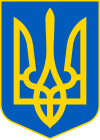Prime minister of Ukraine
| Prime Minister of Ukraine Прем'єр-міністр України |
|
|---|---|

|
|
| Appointer | Verkhovna Rada |
| Term length | Duration of the parliamentary convocation (5 years) |
| Inaugural holder | Volodymyr Vynnychenko |
| Formation | June 28, 1917 |
| Succession | None; resignation or removal renders cabinet illegitimate |
| Salary | ₴20,000 per month |
| Website | www.kmu.gov.ua |
The Prime Minister of Ukraine (Ukrainian: Прем'єр-міністр України, Prem'ier-ministr Ukrayiny) is Ukraine's head of government, presiding over the Cabinet of Ministers of Ukraine, which is the highest body of the executive branch of the Ukrainian government. The position replaced the Soviet post of the Chairman of Council of Ministers of the Ukrainian SSR, which was established on March 25, 1946.
Since Ukrainian independence from the Soviet Union in 1991, there have been sixteen prime ministers, or twenty, counting acting PMs. Arseniy Yatsenyuk was the first Prime Minister who came from Western Ukraine. Two prime ministers were born in the Russian SFSR.
The current prime minister is Volodymyr Groysman since he was sworn on 14 April 2016.
The prime minister is appointed by the president with the consent of the Verkhovna Rada. The consent is deemed granted by the parliament when a simple majority of its constitutional membership votes in favour of the candidate nominated by the president. The highest parliamentary approval to date was received by Yulia Tymoshenko who was appointed the Prime Minister on February 4, 2005 with 373 votes in the Verkhovna Rada. Other prime ministers who received more than 300 votes were Arseniy Yatsenyuk (371), Yatsenyuk again in 2014 (341)Vitold Fokin (332), and Leonid Kuchma (316).
The procedure of granting consent by the parliament is usually preceded by several days of comprehensive consultations and interviews of the candidate by the parliamentary factions. The approval by the legislature is not a mere formality. Some candidates were ratified by a narrow margin and a candidate may be turned down. For instance, in 1999, Valeriy Pustovoitenko fell three votes short of being re-confirmed after he tendered his resignation at the second inauguration of President Leonid Kuchma in 1999. Kuchma chose Viktor Yushchenko as his alternative candidate. Another example is the approval of Yuriy Yekhanurov's candidacy (he fell three votes short of approval, but was confirmed on the second attempt two days later).
...
Wikipedia

